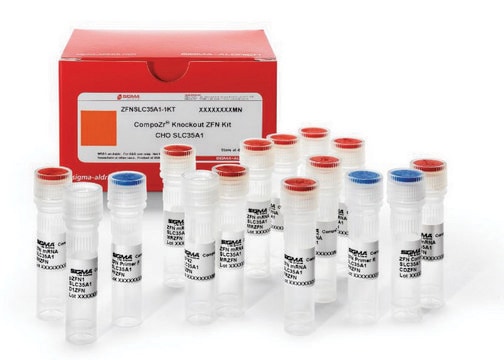Wszystkie zdjęcia(1)
Key Documents
L9639
Ricin B chain from Ricinus communis (castor bean)
buffered aqueous solution
Zaloguj sięWyświetlanie cen organizacyjnych i kontraktowych
About This Item
Polecane produkty
Postać
buffered aqueous solution
temp. przechowywania
2-8°C
Działania biochem./fizjol.
Ricin B chain has an affinity for galactose and saccharides containing nonreducing terminal β-galactosyl units. This affinity allows the B chain to bind to cell surface glycoconjugates. In the intact ricin toxin, the surface binding by the B chain allows the A chain to enter into the cell. The saccharide binding capability of ricin B chain is independent of the presence of the A chain.
Inne uwagi
Ricinus communis toxin (also named RCA60, RCAII, Ricin D, or RCL III) is a highly toxic protein, mol. wt. ~60 kDa, composed of two chains, A and B, connected by a single disulfide bridge.
Jakość
Electrophoretically pure (SDS-PAGE)
Postać fizyczna
Solution in 10 mM phosphate, pH 6.5, containing 0.15 M NaCl, 10 mM galactose, 0.5 mM dithioerythritol and 0.02% sodium azide
Uwaga dotycząca przygotowania
Highly purified by affinity chromatography
Komentarz do analizy
Agglutination activity is expressed in μg/ml and is determined from serial dilutions in phosphate buffered saline, pH 7.2, of a 1 mg protein per mL solution. This activity is the lowest concentration to agglutinate a 2% suspension of human erythrocytes after 1 hour incubation at 25 °C.
This page may contain text that has been machine translated.
Kod klasy składowania
12 - Non Combustible Liquids
Klasa zagrożenia wodnego (WGK)
WGK 1
Temperatura zapłonu (°F)
Not applicable
Temperatura zapłonu (°C)
Not applicable
Certyfikaty analizy (CoA)
Poszukaj Certyfikaty analizy (CoA), wpisując numer partii/serii produktów. Numery serii i partii można znaleźć na etykiecie produktu po słowach „seria” lub „partia”.
Masz już ten produkt?
Dokumenty związane z niedawno zakupionymi produktami zostały zamieszczone w Bibliotece dokumentów.
Nasz zespół naukowców ma doświadczenie we wszystkich obszarach badań, w tym w naukach przyrodniczych, materiałoznawstwie, syntezie chemicznej, chromatografii, analityce i wielu innych dziedzinach.
Skontaktuj się z zespołem ds. pomocy technicznej








